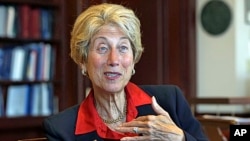NEW YORK —
New York Mayor Michael Bloomberg is challenging a federal judge’s order for reforms in a controversial policing practice known as "stop, question and frisk."
U.S. District Court Judge Shira Scheindlin ruled Monday that New York police had racially discriminated and violated the constitutional rights of minorities in choosing whom to stop for questioning and frisking for weapons or other contraband.
The decision, following a trial of a class action lawsuit, found that from 2004 to 2012 hundreds of thousands of New Yorkers, overwhelmingly young men of color, were stopped and searched by police who had no objective basis for suspicion. The great majority were let go without an arrest or summons, and without contraband having been found - evidence, according to the ruling, that the stops should not have been made in the first place.
In many police reports, the judge wrote, the only basis reported for a stop was that the subject was in a “high crime” area, or had made “furtive movements.” No specific suspected crime was listed in police reports for 36 percent of the stops in 2009.
According to the decision, the police policy resulted in widespread violations of the 4th Amendment, which protects against unreasonable searches and seizures, and the 14th Amendment, which guarantees equal protection of the laws. The ruling said that the city’s highest officials had “turned a blind eye to the evidence” and “willfully ignored overwhelming proof” of racial profiling by New York police.
At a news conference, Mayor Bloomberg rejected the ruling and said the judge was biased against the police.
“Throughout the case, we didn't believe we were getting a fair trial, and this decision supports that belief,” he said.
In the last decade, he said, crime in New York has dramatically declined as stop-and-frisk numbers have risen. He said the policy had prevented violent crime by discouraging people from carrying guns.
“The fact that fewer guns are on the street now shows that our efforts have been successful,” the mayor said. “There is just no question that Stop-Question-Frisk has saved countless lives. And we know that most of the lives saved, based on the statistics, have been black and Hispanic young men.”
Crime has dropped elsewhere in the U.S. as well, including in cities without similar stop-and-frisk policies.
Judge Scheindlin’s opinion did not address whether the policy is effective, but noted that “the enshrinement of constitutional rights necessarily takes certain policy choices off the table.” While deterring crime was a “laudable” goal, she wrote, “this method is unconstitutional.” Being stopped and frisked, she wrote, was “a demeaning and humiliating experience. No one should live in fear of being stopped whenever he leaves his home to go about the activities of daily life.”
In addition to appointing an independent monitor to oversee the police department’s compliance with the Constitution, Judge Scheindlin ordered other steps, including a pilot program requiring police in some New York neighborhoods to wear lapel cameras to document their encounters with civilians.
New York officials said the city may seek to prevent the ruling from taking effect until after an appeal is filed and decided.
U.S. District Court Judge Shira Scheindlin ruled Monday that New York police had racially discriminated and violated the constitutional rights of minorities in choosing whom to stop for questioning and frisking for weapons or other contraband.
The decision, following a trial of a class action lawsuit, found that from 2004 to 2012 hundreds of thousands of New Yorkers, overwhelmingly young men of color, were stopped and searched by police who had no objective basis for suspicion. The great majority were let go without an arrest or summons, and without contraband having been found - evidence, according to the ruling, that the stops should not have been made in the first place.
In many police reports, the judge wrote, the only basis reported for a stop was that the subject was in a “high crime” area, or had made “furtive movements.” No specific suspected crime was listed in police reports for 36 percent of the stops in 2009.
According to the decision, the police policy resulted in widespread violations of the 4th Amendment, which protects against unreasonable searches and seizures, and the 14th Amendment, which guarantees equal protection of the laws. The ruling said that the city’s highest officials had “turned a blind eye to the evidence” and “willfully ignored overwhelming proof” of racial profiling by New York police.
At a news conference, Mayor Bloomberg rejected the ruling and said the judge was biased against the police.
“Throughout the case, we didn't believe we were getting a fair trial, and this decision supports that belief,” he said.
In the last decade, he said, crime in New York has dramatically declined as stop-and-frisk numbers have risen. He said the policy had prevented violent crime by discouraging people from carrying guns.
“The fact that fewer guns are on the street now shows that our efforts have been successful,” the mayor said. “There is just no question that Stop-Question-Frisk has saved countless lives. And we know that most of the lives saved, based on the statistics, have been black and Hispanic young men.”
Crime has dropped elsewhere in the U.S. as well, including in cities without similar stop-and-frisk policies.
Judge Scheindlin’s opinion did not address whether the policy is effective, but noted that “the enshrinement of constitutional rights necessarily takes certain policy choices off the table.” While deterring crime was a “laudable” goal, she wrote, “this method is unconstitutional.” Being stopped and frisked, she wrote, was “a demeaning and humiliating experience. No one should live in fear of being stopped whenever he leaves his home to go about the activities of daily life.”
In addition to appointing an independent monitor to oversee the police department’s compliance with the Constitution, Judge Scheindlin ordered other steps, including a pilot program requiring police in some New York neighborhoods to wear lapel cameras to document their encounters with civilians.
New York officials said the city may seek to prevent the ruling from taking effect until after an appeal is filed and decided.





